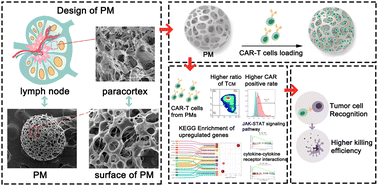Chimeric antigen receptor T cell (CAR-T) therapy has shown remarkable promise in treating hematological malignancies. However, the ex vivo expansion of CAR-T cells is time-consuming, potentially impairing CAR-T cell function. Physiologically, T cell activation and proliferation occur within the lymph node (LN) paracortex, a dynamic environment structured by a three-dimensional (3D) reticular network (RN) that promotes cell migration and mediator delivery. Mimicking this physiological niche offers a compelling strategy to improve CAR-T cell expansion. Inspired by the structure of the RN, we developed a biomimetic RN-like poriferous microsphere (PM) to establish a 3D culture platform optimized for both T cell and CAR-T cell proliferation. This engineered system not only significantly enhanced the proliferation rates of human T cells and CAR-T cells compared to conventional methods, but also preserved a higher proportion of central memory T cells (TCM) and reduced the expression of exhaustion markers (PD-1, TIM-3, and LAG-3). Moreover, CAR-T cells expanded in PMs exhibited superior anti-tumor efficacy in both ex vivo and in vivo models, which correlated with the enrichment of pathways associated with robust T cell function at the RNA level. Overall, this biomimetic platform addresses critical limitations in human T/CAR-T cell expansion, preserving cell function and improving therapeutic outcomes.
